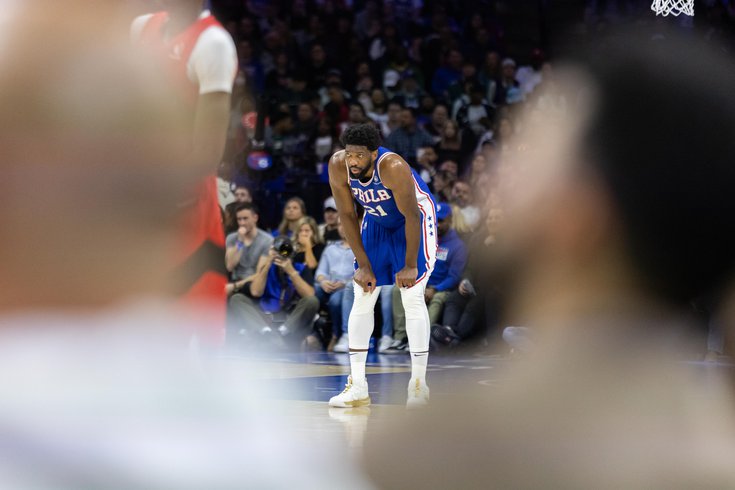
March 31, 2022
 Colleen Claggett/for PhillyVoice
Colleen Claggett/for PhillyVoice
Joel Embiid stands on the court during the Sixers' game against the Raptors at the Wells Fargo Center on March 20.
With the Sixers' season down to just seven games remaining, it appears more and more likely Joel Embiid is heading to a second straight MVP caliber season resulting in an award snub.
For anyone who has been a sports fan in Philadelphia, this is nothing new. There have been some pretty significant MVP performances overlooked over the last 60+ years, some due to another player who is slightly more dazzling, and some because award voters are, well, idiots sometimes.
Sixers fans certainly hope Embiid's inclusion on this list is only temporary, but with the big man likely to be second in voting for the second straight year, there is no shame in the company he's amongst on the list below.
Here's a look at the 10 (and some honorable mention) most deserving seasons from Philly athletes that were snubbed from winning their respective sport's most coveted award. (For all you city historians out there, we are admittedly keeping this to seasons since 1960):
Sonny Jurgensen, Eagles, 1961 (3rd)
In a season where he posted numbers — in a 14 game season — that any quarterback in 2022 would be proud of, Jurgensen threw for 32 touchdowns and 3,753 yards (though his completion percentage and 24 INTs leave something to be desired). He fell behind ball carriers Jim Brown and Paul Hornung for the trophy in '61. Interestingly, it was Jurgensen's first year as a starter, a year after Norm Van Brocklin won the MVP Award in 1960.
Ryan Howard, Phillies, 2008 (2nd)
There is a strong argument to be made that Ryan Howard should have been a multi-MVP winner. In 2008, the year the Phils would go on to win the World Series, Howard led all of baseball with 48 homers and 146 RBI. He played in all 162 games, but lost the award to Albert Pujols, whose .357 batting average paired with decent power numbers was too hard to deny.
Howard's MVP numbers two seasons prior set an impossible standard to keep up with, as he hit .313, 58 homers and 139 RBI. He bested Pujols for the hardware that year.
Mike Schmidt, Phillies, 1983 (3rd)
Schmidt has won three other MVPs, but in '83 the best third baseman in Phils history led the league in walks, on base rate and homers, and had an impressive 6.9 WAR. However, it wasn't enough for him to beat out Dale Murphy or Andre Dawson, each of whom finished ahead with slightly better but not overwhelmingly superior seasons.
Donovan McNabb, Eagles, 2000 (2nd)
The Eagles' young QB finished second behind Marshall Faulk and his ridiculous 26 total touchdowns and 2,100+ total yards. But McNabb was at the peak of his powers in 2000 as a dual threat QB, throwing for 3,356 yards and 21 touchdowns while rushing for 629 and six scores on the ground. It is an interesting contrast to 22 years later, when a line like McNabb's goes from MVP runner up to middle of the pack.
The defensive player of the year had a then NFL record 21 sacks and was not considered by the voters for NFL MVP. Oh, and he did it in just 12 games (!). It is extremely rare for a non offensive player to win MVP so this really falls as an honorable mention — though we should mention that Lawrence Taylor's 20.5 sacks in 1986 did win him MVP honors. Hmm...
The Flyers' former captain is clearly one of the best three or four players in franchise history, but he has never hoisted the Hart Trophy. Perhaps his best shot at it came in 2018, when he scored 34 goals and 102 points with a +28 showing when on the ice. 'G' got 10 first place votes, but ultimately finished in fourth behind three wingers with less points than he had.
Taylor Hall won the hardware with 93 points, with Nathan MacKinnon and Anze Kopitar each finishing ahead of Giroux in the voting. He also finished in third place in 2013-14, but his 86 points were well behind first place finisher Sidney Crosby that season.
It makes sense that Wentz didn't win MVP honors, because his knee was blown out during a remarkable victory over the Rams in Week 14 that ended his season, and would lead to Nick Foles assuming the starters role (and ironically his own Super Bowl MVP trophy).
But we would not be telling the full history of Philadelphia sports if we did not stop and remark on his MVP-caliber performance during those 13 games. Wentz threw a team record 33 touchdowns to just seven interceptions and threw for 3,296 yards and led the Birds to the best record in football. Tom Brady would take the award after Wentz' injury. Unfortunately for Wentz, he's hasn't been able to maintain that level of play since.
In the year the Phils made a dominating run to the World Series (before losing to the Blue Jays), Dykstra actually posted an MVP caliber season, collecting the most at bats in baseball that year and hitting .305 with 37 stolen bases. No one had more base hits in 1993 than the Phillies' outfielder. He actually got four first place votes but was unable to surpass Barry Bonds 48 homers, 123 RBI, and .336 batting average (pre steroids).
Last season, Embiid came in second to Nikola Jokic, who nearly unanimously took MVP honors after he had a historically good season for a big man. The same thing seems destined to happen in 2021-22.
Here's look at Jokic in each of the last two seasons in contrast to Embiid. You can draw your own conclusions. First, 2020-21
| Embiid | Jokic | |
| PPG | 28.5 | 26.4 |
| RPG | 10.6 | 10.8 |
| S, BPG | 1.0, 1.4 | 1.3, 0.7 |
| Team record | 49-23 | 47-25 |
Jokic also averaged 8.3 assists per game — but most notably played in 21 more games than Embiid in the COVID-shortened season. Here's a look at this season so far:
| Embiid | Jokic | |
| PPG | 29.9 | 26.3 |
| RPG | 11.4 | 13.6 |
| S, BPG | 1.2, 1.4 | 1.4, 0.9 |
| Team record | 46-29 | 45-31 |
Jokic has eight assists per game so far. There are other factors to consider of course, like shooting percentage and advanced metrics. But it would be hard to argue Embiid is not being disrespected at least a little, playing with a less talented supporting cast for most of the last two seasons. We'll see if he can finish the regular season strong and perhaps change some minds.
In a dogfight of an MVP race, Cunningham narrowly lost to Joe Montana by 10% of the vote. Warren Moon was also in the mix, with the three splitting first place votes. It was a clash of style, but you can see a pretty solid MVP case for each QB:
1. Montana: 3,944 yards, 62% completion, 26 TD, 16 INT, 14-2 record
2. Cunningham: 3,466 yards, 58% completion, 30 TD, 13 INT, 942 rush yards, 5 TD, 10-6 record
3. Moon: 4,689 yards, 62% completion 33 TD, 13 TD, 9-7 record
Interestingly, Moon won offensive player of the year for that performance, with Cunningham finishing second there as well. The Niners were the best team in football, so that surely strengthened Montana's case. But based on the raw numbers, Cunningham was snubbed pretty hard for a spectacular campaign.
How Parent, who led the Flyers to their first Stanley Cup title, was passed over for his insane performance this season is quite a travesty. Granted, it is hard to compare a goalie to an offensive player, but the Flyers did have 112 points — the most in their division — that season.
The 28-year-old net minder stopped opposing shots at an impressive .932 rate, and he allowed a jaw-dropping 1.89 goals per game while securing 47 victories. It still holds it own as one of the best single season goaltending performances ever. Boston's Phil Esposito won the Hart trophy that season with 68 goals and 77 assists for an also impressive 145 points.
Depending how you look at this one it's either a travesty, or it's just the way things work. Its ultra-rare for a pitcher to win MVP honors, seeing as they have their own award, the Cy Young. But Steve Carlton's 1972 season was just bonkers. The hurler went 27-10 with a 1.97 ERA in 41 starts. Those are numbers you would expect to see back in the old-timey days, but not in the modern era.
This Carlton season and his insane 12.8 WAR won him Cy Young honors with all 24 first place votes, but he finished fifth for MVP honors behind some good, but not all-time great offensive seasons from offensive players (Joe Morgan, Willy Stargell, Billy Williams and Johnny Bench). Even more impressive is that the Phillies won just 58 games that year. He was more or less solely responsible for 47% of his teams wins. How can you be more valuable than that?
This one is absolutely bonkers. Chamberlain, then with the Philly Warriors, averaged a remarkable 50.4 points per game and 25.7 rebounds per game. No, those are not typos. And somehow, he was the MVP runner up to his rival Bill Russell, who posted 18.9 points and 23.6 rebounds per game for the Celtics. And no, Russell did not shoot better from the field than Chamberlain either.
Relevant, but probably not the determining factor since the votes are tallied prior, the Celts beat the Warriors in the Eastern Conference Finals before winning an NBA title that season.
In one of the closest, most controversial MVP races in history, Barkley got snubbed during his best season in Philadelphia. It was a wild three-way finish. Here's a look at the three MVP resumes from three NBA Hall of Famers:
| Barkley | Jordan | Johnson | |
| PPG | 25.2 | 33.6 | 22.3 |
| RPG | 11.5 | 6.9 | 6.6 |
| APG | 3.9 | 6.3 | 11.5 |
| Total votes | 614 | 38 for first | 564 | 21 for first | 636 | 27 for first |
Due to the way the voting is tabulated, Barkley came in second despite getting 11 more first place votes than Magic Johnson. He shot an NBA best 63.2% on two-point field goals and posted 17.3 win shares, the best of his entire career. Barkley would go on to Phoenix a few seasons later and get his MVP trophy in 1993.
Follow Evan on Twitter: @evan_macy
Like us on Facebook: PhillyVoice Sports